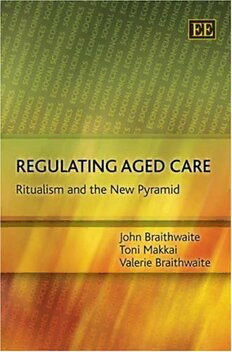
Regulating Aged Care: Ritualism and the New Pyramid PDF
384 Pages·2007·1.708 MB·English
Most books are stored in the elastic cloud where traffic is expensive. For this reason, we have a limit on daily download.
Preview Regulating Aged Care: Ritualism and the New Pyramid
Description:
This book is a major new contribution to regulatory theory from three members of the world-class regulatory research group based in Australia. It marks a major new development in responsive regulatory theory in which a strengths-based pyramid complements the regulatory pyramid. The authors compare the accomplishments of nursing home regulation in the US, the UK and Australia during the last 20 years and in a longer historical perspective. They find that gaming and ritualism, rather than defiance of regulators, are the greatest challenge for improving safety and quality of life for the elderly in care homes. "Regulating Aged Care" shows how good regulation and caring professionalism can transcend ritualism. Better regulation is found to be as much about encouragement to expand strengths as incentives to fix problems. The book is underpinned by one of the most ambitious, sustained qualitative and quantitative data collections in both the regulatory literature and the aged care literature. This study provides an impressive evidence base for both theory development and reassessment of policy and practitioner responses in the field. The book will find its readership amongst regulatory scholars in political science, law, socio-legal studies, sociology, economics and public policy. Gerontology and health care scholars and professionals will also find much to reflect upon in the book.
See more
The list of books you might like
Most books are stored in the elastic cloud where traffic is expensive. For this reason, we have a limit on daily download.
